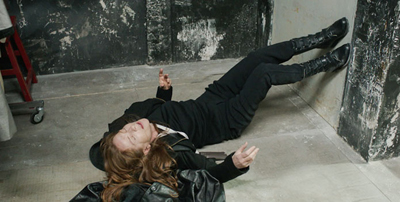TIFF: Asghar Farhadi Returns With "The Past"
 Sunday, September 8, 2013 at 3:04PM
Sunday, September 8, 2013 at 3:04PM 
Weirdest Cannes best actress win"
Nick whispered to me as the end credits unspooled on Asghar Farhadi's The Past. Co-sign. It's not that Berenice Bejo, who was charming in her international breakthrough in The Artist, is not a good actress and she's certainly a beauty. But at least in the context of The Past she's a blank one. Despite the plethora of information writer/director Asghar Farhadi (A Separation) keeps sending us -- e-mails are an enormous plot point -- I'm still waiting to hear anything substantial about the character of Marie, Bejo's woman at its center.
Yes yes, we learn that she still loves her ex-husband Ahmad (Ali Mosaffa), has troubles with her teenage daughter Lucie (Pauline Burlet, wonderfully cast) and is cagey about her new relationship to Samir (Tahar Rahim). But we learn all of this very quickly in the movies promising opening scenes in which Marie picks up her ex-husband from the airport and brings him home rather than to a hotel room he asked for.
 But after that... what else?
But after that... what else?
Farhadi has quite a lot else in store for us... though strangely what seems to take precedence is the intricate minutae of its plot, rather than the characterizations. It's not that we learn nothing about the characters exactly, but that they seem to be serving the intricacies of its many twists rather than the other way around. Like Farhadi's recent masterpiece A Separation, we return again and again to the same seemingly tiny event, although this one is offscreen, and its enormous ripples. To be fair to Berenice we do learn two more thing about Marie. First, she's a bit of a dramatic queen and pushes situations and conversations past their natural end point until they reignite or explode. Second, and long delayed... that she is guilt-ridden about her relationship with Samir without realizing it. But it's too little too late for a film that overextends its welcome and pushes its luck with its intended cartographic drama.
 Marie between her men. She does this to herself.
Marie between her men. She does this to herself.
When your favorite touch in a hotly anticipated movie by a brilliant director is the subtle dynamism of its title card ("The Past" is erased by windshield wipers as the ex-lovers are reunited in the opening scene) and the thing you relate to most visually is the endearing confused scowl on a young actor's face (Elyes Aguis is just superbly natural as Fouad, Samir's son) something has gone quite wrong. Thanks to a fine turn from Mossafa, Ahmad the exhusband, is the film's most interesting and well defined character. The movie suffers considerably whenever he (wisely) steps out of his place in this quiet heavy love triangle. Three may be a crowd but Marie and Samir are too blandly conceived to carry the film's heavy heart and complicated plot on their own. C

Podcast a group discussion of TIFF 13: Oscar buzz, our favorite films, and more
Ambition & Self Sabotage on Gravity and Eleanor Rigby: Him & Her
Mano-a-Mano Hallucinations Norway's Pioneer & Jake Gyllenhaal² in Enemy
Quickies Honeymoon, Young & Beautiful, Belle
Labor Day in a freeze-frame nutshell
Jessica Chastain at the Eleanor Rigby Premiere
August Osage County reactions Plus Best Picture Nonsense
Rush Ron Howard's crowd pleaser
Queer Double Feature: Tom at the Farm and Stranger by the Lake
Boogie Nights Live Read with Jason Reitman and Friends
First 3 Screenings: Child's Pose, Unbeatable and Isabelle Huppert in Abuse of Weakness
TIFF Arrival: Touchdown in Toronto. Two unsightly Oscars











